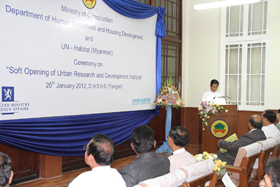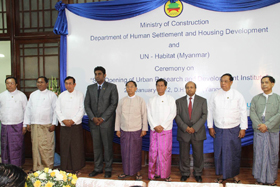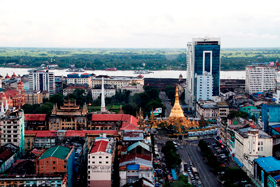Myanmar, 20 Jan 2012
 Minister U Khin Maung Myint giving opening remarks at the Ceremony;
Minister U Khin Maung Myint giving opening remarks at the Ceremony;The Union Minister of Construction, U Khin Maung Myint today opened Myanmar’s first Urban Research and Development Institute (URDI), established with UN-HABITAT support within the Department of Human Settlement and Housing Development (DHSHD), which will undertake research to strengthen policy formulation and conduct training programmes to build national and local government capacities in inclusive urban planning and management which will include fostering urban-rural linkages. In this sense the opening of URDI marks the beginning of a wider collaboration between the Republic of the Union of Myanmar and the United Nations in the field of urban development, with a view to making the urban sector all inclusive, environmentally sustainable and complementary to rural development.
 Director General, Mr. U Aung Win of Department of Human Settlement and Housing Development (DHSHD), has cut the ribbon along with the UN Resident and Humanitarian Coordinator Mr. Ashok Nigam at the opening Ceremony;
Director General, Mr. U Aung Win of Department of Human Settlement and Housing Development (DHSHD), has cut the ribbon along with the UN Resident and Humanitarian Coordinator Mr. Ashok Nigam at the opening Ceremony;In his opening speech, the Union Minister of Construction, U Khin Maung Myint, expressed his hope that the newly opened URDI will assist the Government’s endeavors of building a new, modern and developed nation. He added that the research activities in the area of urban and regional development and training activities concerned with urban studies trough the services of URDI will facilitate capacity building in human resource sector that is a basic need for tackling urban issues.
UN Resident and Humanitarian Coordinator Mr. Ashok Nigam said that establishing URDI is a clear reflection of one of UN’s core commitments to build the capacity of national counterparts. He added that the UN and international community are currently witnessing exciting new developments in Myanmar, starting with the installation of the new government which created a clear window of opportunity to promote and strengthen collaboration and action for the socio economic progress of Myanmar.
 Group Photo with Deputy Minister of Ministry of Construction, Chief Minister of Yangon Region, Political Advisor of the President Office, UN-Habitat Country Manager, and UN Resident Coordinator Mr. Ashok Nigam;
Group Photo with Deputy Minister of Ministry of Construction, Chief Minister of Yangon Region, Political Advisor of the President Office, UN-Habitat Country Manager, and UN Resident Coordinator Mr. Ashok Nigam; Based on the global trend in population movement and the changing structure of economic growth, urbanization is already a key factor in determining the country’s ability to address development targets set by the Government. Mr. Srinivasa Popuri, the UN-HABITAT Myanmar Country Manager said that the establishment of URDI is an integral part of the agency’s assistance being offered to the Government in its quest for a better future for the people of Myanmar.
UN-HABITAT is cooperating with the relevant Ministries in the sectors that are pertaining to Habitat Agenda and implementing several normative and operational activities focusing on basic access of services to settlements, while addressing cross-cutting issues of gender, risk reduction, environment and climate change.
 Yangon
YangonUN-HABITAT and the Union Government of Myanmar, represented Ministry of Construction, signed a Memorandum of Understanding (MoU) in September 2011 on several areas of technical cooperation programmes in Myanmar of which establishment of URDI and development of National Building Code Projects are supported by Norwegian Ministry of Foreign Affairs.




















